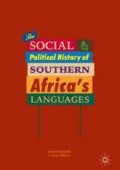Abstract
This chapter discusses the socio-political history of the Shona language. The term Shona was officially coined by Clement Doke, a professor of Bantu languages at the University of the Witwatersrand, to refer to an amalgamation of several mutually intelligible dialects and sub-dialects spoken in different provinces of Zimbabwe. The five main dialects of this language are Zezuru, Karanga, Manyika, Ndau and Korekore. However, the new Constitution of Zimbabwe (2013) officially recognizes Ndau as a separate language. Shona is one of the 16 officially recognized languages in Zimbabwe. It has a long history of standardization and intellectualization, and since the advent of political independence in 1980, it has been one of the national official languages of Zimbabwe together with Ndebele and English. Shona is well-studied and has been used in the development of various creative genres since the 1930s. It cannot, therefore, be counted as one of the endangered languages of southern Africa for a variety of reasons. First, literacy in the language is transmitted through formal education from elementary school to university level. Second, it is used orally by all generations and is effectively used in written form. Third, it is acquired as a first language by a majority of Zimbabweans and as a second language by speakers of other languages in the country. Its vitality is, thus, unquestionable.
Access this chapter
Tax calculation will be finalised at checkout
Purchases are for personal use only
References
Bleek, W. H. I. (1856). The languages of Mosambique. London: Harrison.
Chimhundu, H. (Ed.). (1996). Duramazwi reChishona. Harare: College Press.
Chimhundu, H. (Ed.). (2001). Duramazwi Guru reChishona. Harare: College Press.
Chimhundu, H. (2005). Doke and the development of standard Shona. In C. M. Doke (Ed.), Report on the unification of the Shona dialects (pp. 8–75). A photographic reprint with an introduction by Herbert Chimhundu. Oslo: ALLEX Project/Unipub AS.
Chimhundu, H. (2010). Documenting the Shona-Nyai cluster as a cross border language. In H. Chimhundu, W. Magwa, & A. Chebanne (Eds.), Harmonization of Shona-Nyai varieties (pp. 25–46). Cape Town: CASAS.
Doke, C. M. (1931). Report on the unification of the Shona dialects. Hertford: Stephen Austin.
Downing, L. J., & Kadenge, M. (2015). Prosodic stems in Zezuru Shona. Southern African Linguistics and Applied Language Studies., 33(3), 291–305.
Fortune, G. (1955). An analytical grammar of Shona. London: Longmans, Green and Co.
Fortune, G. (1972). A guide to Shona spelling. Salisbury: Longman.
Fortune, G. (1980–1984). Shona grammatical constructions (Vol. 1–2). Harare: Mercury Press.
Government of Zimbabwe. (2013). Constitution of Zimbabwe. Harare: Government Printers.
Guthrie, M. (1948). The classification of Bantu languages. London: Oxford University Press.
Hachipola, S.J. 1998. A survey of minority languages of Zimbabwe. Harare: University of Zimbabwe Publications.
Hartmann, A. M. (1893). An outline of the grammar of the Mashonaland language. Cape Town: F.Y. St. Leger Printer.
Jones, D. (1911). The pronunciation and orthography of the Chindau language. London: University of London Press.
Kadenge, M. (2014). Comparing nasal-obstruent clusters derived from /mu-/reduction in Shangwe and Zezuru: An optimality theory analysis. Language Matters: Studies in the Languages of Africa., 45(1), 40–62.
Kadenge, M., & Mugari, V. (2015). The current politics of African languages in Zimbabwe. Per Linguam: A Journal for Language Learning, 31(2), 21–34.
Kadenge, M., & Nkomo, D. (2011). The politics of the English language in Zimbabwe. Language Matters: Studies in the Languages of Africa, 42(2), 248–162.
Mlambo, M. (2009). A survey of the language situation in Zimbabwe: Is there a Zimbabwean variety of English? If so, who speaks it? English Today, 25(2), 18–24.
Mpofu-Hamadziripi, N., Ngunga, A., Mberi, N. E., & Matambirofa, F. (2013). A descriptive grammar of Shona. Harare: Sable Press.
Mudzingwa, C. (2010). Shona morphophonemics: Repair strategies in Karanga and Zezuru. PhD dissertation, University of British Columbia.
Mudzingwa, C. (2014). Initial onsetless syllables in Karanga and Zezuru: A comparative analysis. Language Matters: Studies in the Languages of Africa., 45(1), 63–90.
Mudzingwa, C., & Kadenge, M. (2011). Comparing hiatus resolution in Nambya and Karanga: An optimality theory account. Nordic Journal of African Studies., 20(3), 203–240.
Mudzingwa, C., & Kadenge, M. (2014). Coalescence as a hiatus resolution strategy in chiKaranga- a dialect of chiShona. South African Journal of African Languages., 34(2), 127–136.
Myers, S. (1987). Tone and the structure of words in Shona. Ph.D. dissertation, University of Massachusetts, Amherst.
Ndhlovu, F. (2008). The conundrums of language policy and politics in South Africa and Zimbabwe. Australian Journal of Linguistics, 28(1), 59–80.
Ndhlovu, F. (2009). The politics of language and nation building in Zimbabwe. Bern: Peter Lang.
Wilder, G. A. (1915). Chindau-English and English-Chindau vocabulary. Melsetter: American Board Mission.
Author information
Authors and Affiliations
Editor information
Editors and Affiliations
Copyright information
© 2018 The Author(s)
About this chapter
Cite this chapter
Kadenge, M. (2018). Shona. In: Kamusella, T., Ndhlovu, F. (eds) The Social and Political History of Southern Africa's Languages. Palgrave Macmillan, London. https://doi.org/10.1057/978-1-137-01593-8_15
Download citation
DOI: https://doi.org/10.1057/978-1-137-01593-8_15
Published:
Publisher Name: Palgrave Macmillan, London
Print ISBN: 978-1-137-01592-1
Online ISBN: 978-1-137-01593-8
eBook Packages: Social SciencesSocial Sciences (R0)

